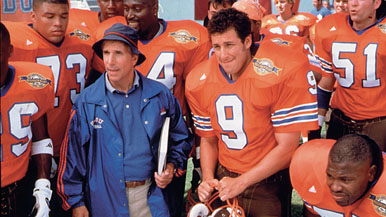Hollywood Psych
By Sean Collier
June 15, 2009
At last, it seems, audiences are responding to the premise rather than the film. Knocked Up, Superbad, The Hangover, and more humble hits like Pineapple Express, Forgetting Sarah Marshall and I Love You, Man have put out smart, targeted ad campaigns that focus on the story and the humor, rather than big stars behaving outrageously. It's important to distinguish that these films have stories, not gimmicks; a gimmick is Mike Myers in a funny suit, a story is we woke up in Vegas and can't find the groom.
Perhaps more interesting is the fact that the new successful comedies are not, by and large, making new stars – at least bankable ones. The 40 Year-Old Virgin, one of the best and most profitable comedies of the last few years, helped to make Steve Carell a household name; that didn't do him much good, however, when it came time to sell tickets for Evan Almighty. Seth Rogen was seen as a new breakout star after Knocked Up; while he's certainly keeping busy, he failed to carry either Zack and Miri Make a Porno or Observe and Report to any real success.
This trend is certainly bad news for actors; whereas ten years ago someone with a success the likes of Knocked Up could reasonably expect to have work thrown at them interminably for quite some time (see again one Stiller, Ben,) now, the right projects have to be continuously selected. Think too of the stars that have not gone anywhere at all, in spite of well-received comedies; Christopher Mintz-Plasse, anyone?
Hopefully, there's good news here for audiences; if filmmakers can no longer rely on a cadre of instant-money stars to pull in dollars, they'll have to pay more attention to what they make and how they market it. This is certainly good news in theory; in practice, however, one wonders if it won't merely produce endless clones of the last big hit.
What producers need to deduce is not what the audiences like (which is variable,) but rather, why this trend is occurring in the first place. There wasn't any big comedy letdown that preceded it; the later Will Ferrell or Jim Carrey movies weren't disasters, by any means, and this shift can't be taken as a sign of audiences losing faith in stars. Perhaps it's merely a by-product of too many big outrageous comedies; perhaps we'd rather laugh hard and think at the same time. This is a premise that the success of the Apatow films would indicate (but The Hangover, good though it may be, contradicts.)
It's more likely that this is simply a shift in tastes, and star-driven comedy will be back. For now, however, The Hangover is yet another chapter in the confusing box-office story of 2009; stars fail, unknowns score, tentpoles flop, January rejects succeed. It'll take time and perspective to sort out what happened this year; come 2010, we'll find ourselves asking what happened, when it happened, and why is there a tiger in the bathroom?
Continued:
1
2
|
|
|
|




